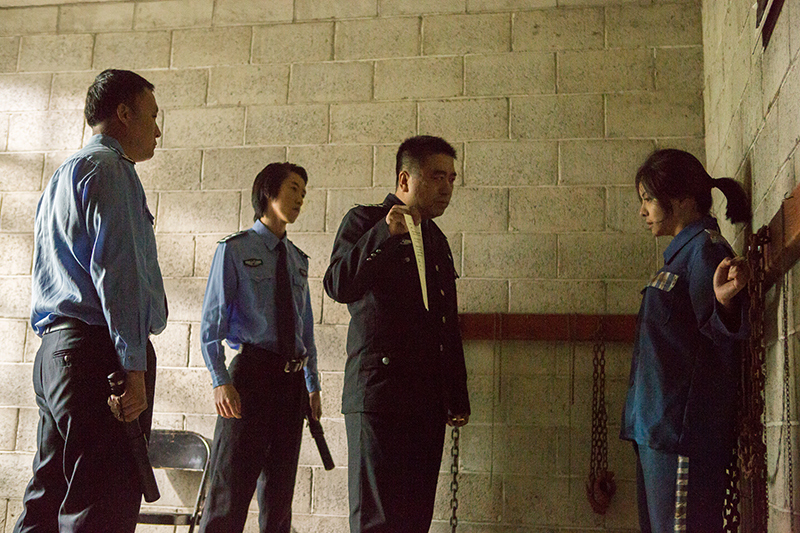
Thriller Based on China’s Organ Harvesting Wins Gabriel Award
ST. LOUIS—After swaying film critics and taking home a prestigious Peabody Award for his documentary “Human Harvest,” director Leon Lee has set his sights on winning over the public with his new thriller, “The Bleeding Edge.” Accepting the Gabriel Award on June 2 may be Lee’s first step toward that goal—a goal that he sees not as a personal victory, but as a chance to raise awareness about the plight of Falun Gong practitioners in China today, and especially about their suffering of forced organ harvesting.
“Hundreds of thousands of prisoners of conscience in China have been killed for their organs. The victims are Falun Gong practitioners, Tibetans, Uyghurs, house church members, and sometimes political dissidents. They are the reason we made the film, and on behalf of them I say thank you. This award brings encouragement, hope, and also moral support, and we will carry on the fight until forced organ harvesting in China has ended,” said Lee in accepting the award.
Sponsored by the Catholic Academy of Communication Professionals, the Gabriel Awards honor excellence in film, network, cable television, radio, and social media for “work that entertains and enriches with a true vision of humanity and a true vision of life,” as the website states.
“The Bleeding Edge” follows two stories on different sides of the globe. In China, Chen Jing (Anastasia Lin), a Falun Gong practitioner, is imprisoned and tortured for her beliefs. On the other side of the world is a Canadian software developer, James Branton (Jay Clift), who sold to the Chinese Communist Party (CCP) surveillance technology, which aids the CCP in tracking those it finds troublesome.
It’s only when Branton wakes up after receiving an emergency heart transplant in China and wonders how the doctors managed to find him a match so easily that he starts to uncover the horror of state-sanctioned forced organ harvesting.
Thus, through two personal stories, the film tracks Western complicity in thousands of deaths of Chinese prisoners of conscience, and also highlights the dignity of people trying to hold on to their spiritual beliefs in the face of overwhelming pressure, and in a world that is seemingly deaf to their plight.
Although the film is fiction, Lee, who spoke to the Epoch Times before the ceremony, says that 90 percent of the scenes come from true events, culled from extensive research on Internet censorship and surveillance technology. He also researched Falun Gong practitioners who survived the tortures of their imprisonment in China.
Lee considers this the most difficult film he has ever made.
First was the problem of casting. Although Anastasia Lin showed unwavering courage and commitment to the film, other actors considered for the male lead backed out, fearing repercussion to their careers. Film companies are trying to break into the Chinese market, and actors hoping to work with these companies don’t want to risk being blackballed.
Actors need look no further than Lin herself for an example of what can happen. As the crowned Miss World contestant representing Canada, Lin found herself deemed persona non grata by China and was denied access to the pageant finals held there.
Also difficult was the huge topic of organ harvesting and its historical significance. Lee felt it especially important to get it right: “The persecution of Falun Gong is one of the largest violations of human rights in modern China, if not in the world, and to put all of this together in one little film, what you do to give people some understanding of what is going on, we felt a very heavy responsibility on our shoulders.”
Apparently the film bore that responsibility well. According to the Gabriel Awards presenters, the film was hard to watch.
Susan Wallace, this year’s awards chair, felt that despite the fact that the film is so distressing and upsetting, it was important for the story to be told, not only for the victims and their families but also “to get people to pay attention and make changes in the world.”
David Hains, president of the Catholic Academy said, “The judges were blown away by the quality of the film, especially because of the subject matter,” and hope that people will be convinced these atrocities are completely unacceptable.
“There isn’t a country anywhere that should be afraid of bringing to light human rights abuses. We are all brothers and sisters; we are all children of God, and our lives and countries need to reflect our brotherhood and it simply cannot be denied,” Hains said.
Lee added that very few films are being made on this topic, so this film presents a chance to learn something about a country that, as the world’s second-largest economy, impacts us all.
“It’s tremendously important that we all learn more about what’s going on there,” he said. “If we all play a part, we can make a huge difference.”
To find out how to see “The Bleeding Edge,” now making the festival circuits, visit TheBleedingEdgeMovie.com/join/
